American Buddhist Citizens' League - Ten Day Vegetarian Calendar

American Buddhist Citizens' League - Ten Day Vegetarian Calendar

A Note on Html Edition of Ten Day Vegetarian Calendar -- Html Print Copies Only Works for Chrome - For Best Printed Copies--Please Click to Use PDF Edition .
Mahayana Buddhist upholders of the Ten Day Uposotha besides observing the Five Precepts (sometimes the Eight Precepts) with more diligence also uphold a Buddhist style vegan diet on these days which also excludes the use of onions, garlic, scallions, chives and related vegetables including asfoetida. Many upholders also observe the same rules for the 1st and 15th lunar day of each month. Some observers also followed the same rules for Buddhist holidays (especially the anniversary days for Sakyamuni Buddha and Guanyin Bodhisattva).
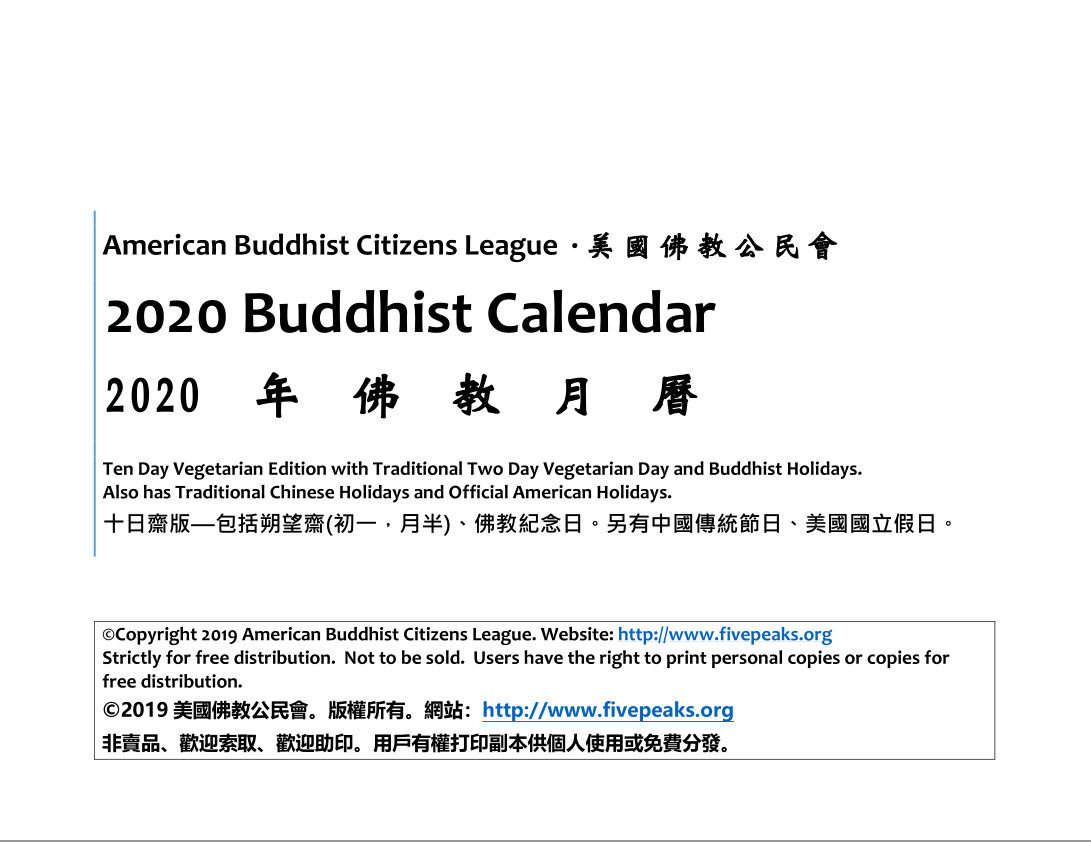



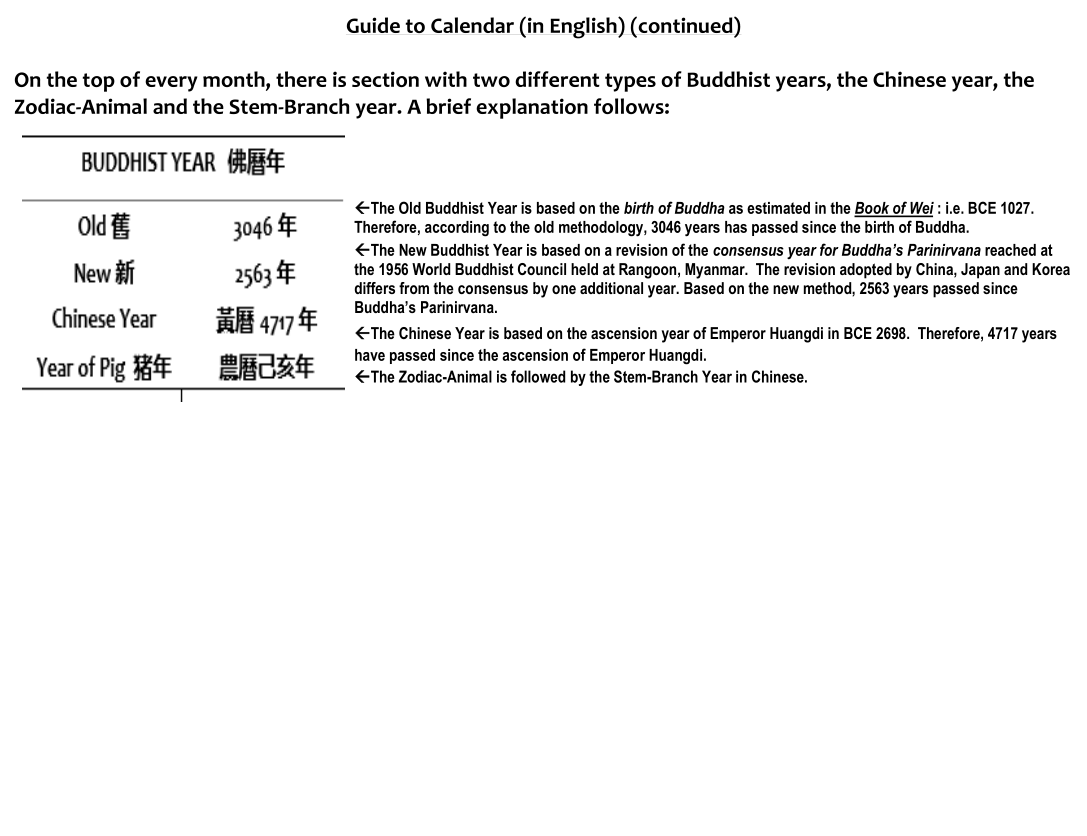
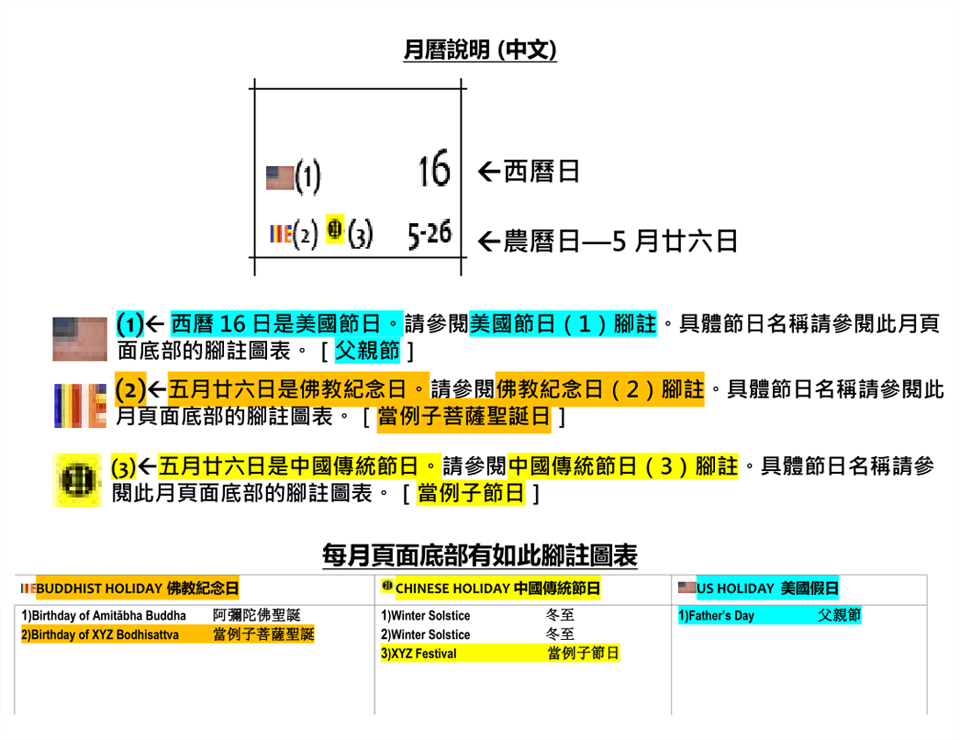
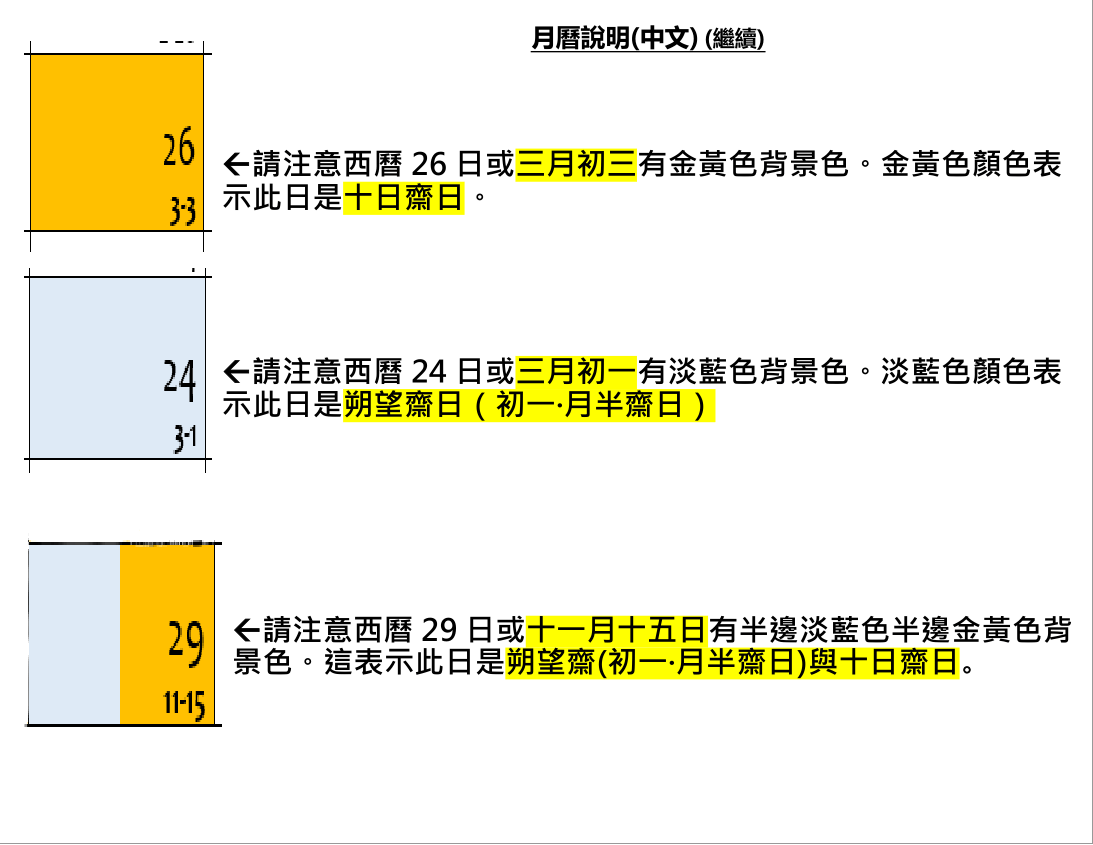
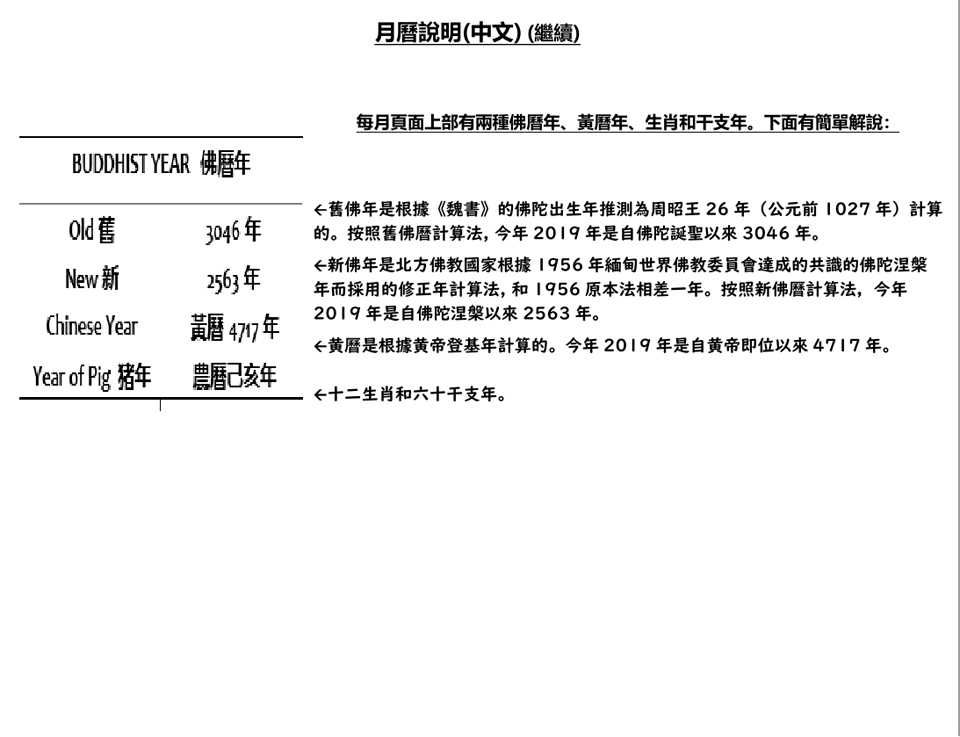
American Buddhist Citizens League
2019 年 12月
美國佛教公民會
This 112 feet statue of Śākyamuni Buddha called the Tian Tan Buddha was dedicated in 1993, and is located at the Po Lin Monastery on Lantau Island, in Hong Kong China. The Tian Tan Buddha’s right hand is showing the abhaya mudra (a gesture of reassurance, protection and dispelling of fear) while his left hand is showing the varada mudra (a gesture of charity and the granting of wishes). Both palms have the sign of the Wheel of the Dharma, which symbolizes the longevity of the Buddha Dharma and its spread everywhere. Ven. Abbot Cho-wai brought back two śarīra from Sri Lanka in 1992. The two śarīra (relics) of Śākyamuni Buddha are now on display at the Hall of Commemoration located on the third floor of the shrine located at the base of the statue. Visitors must show the ticket collector at the Hall of Commemoration a prerequisite receipt from the Po Lin Monastery vegetarian restaurant before admission into the exhibit.
名稱天壇佛總高34米的釋迦牟尼佛像,于1993年在香港大嶼山的寶林寺開放。天壇佛右手示“施無畏印”(手勢象征無怖給眾生)、左手又示“予願印”(手勢象征布施給眾生)。雙掌心示“法輪”標記,象征佛法長存、流傳甚廣。1992年“初慧方丈”請來兩顆從斯里蘭卡來的佛祖舍利子。現時位於雕像基座的三樓紀念堂的展出。看客必須首先向紀念堂售票員顯示寶林寺素齋廳收據,然後才能看展覽。
|
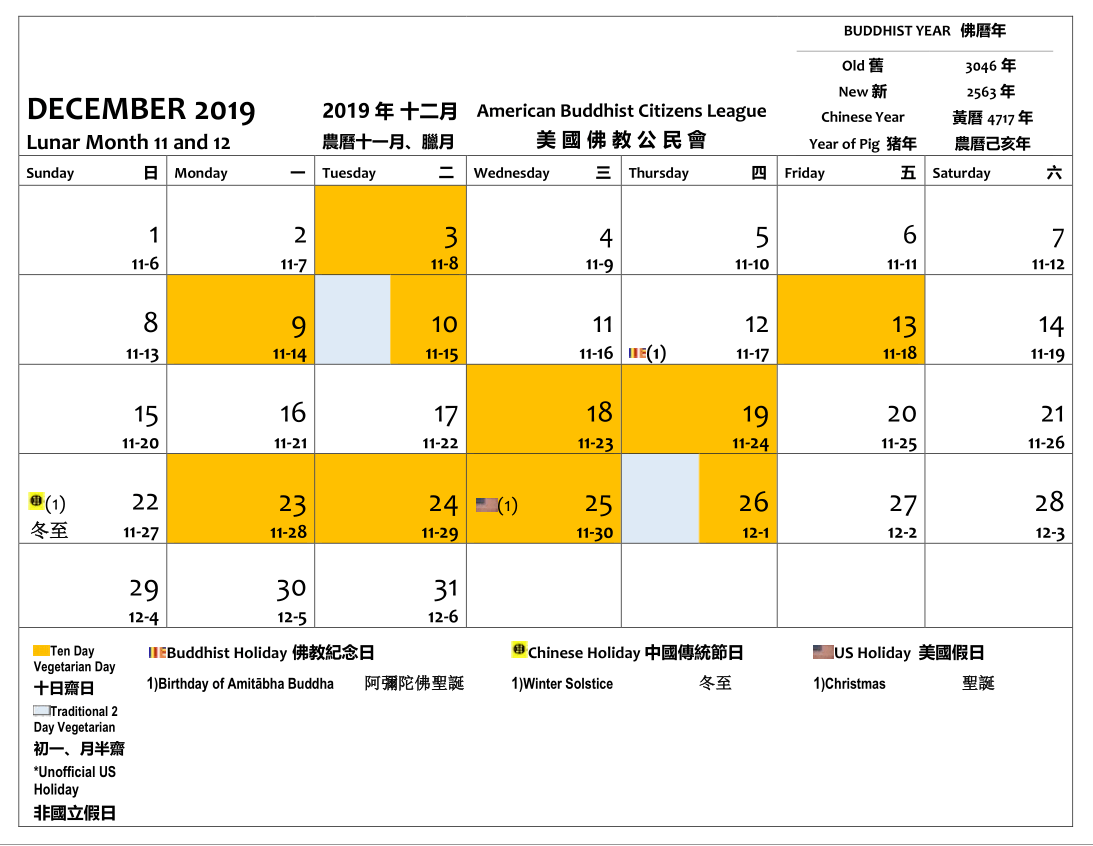
|
American Buddhist Citizens League
2020 年 1月
美國佛教公民會
Golden statue of seated Śākyamuni Buddha dated to 900 CE located in the shrine room of Mahabodhi Temple in Bodhgaya India. The Mahabodhi Temple in Bodhgaya India is one of the four main Buddhist pilgrimage sites mentioned in the Buddhist Tripitaka. The sacred Bodhi tree where Śākyamuni Buddha meditated over 2500 years ago and attained enlightenment is located only a few feet behind the statue.
圖為公元十世紀的金身佛陀坐像。位於印度菩提伽耶鎮摩訶菩提寺的金剛寶座塔大殿內。菩提伽耶是佛教大藏經裡提到的四大佛教朝聖聖地之一。釋迦牟尼佛2500多年前曾經在一棵聖菩提樹下悟道成佛。這棵聖菩提樹只離佛像背面幾米。
|

|
American Buddhist Citizens League
2020 年 2月
美國佛教公民會
One of many votive stupas found surrounding the Mahabodhi Temple in Bodhgaya India. Modern Buddhist pilgrims have gilded a small portion of the lower section of this stupa. Compared with the other three main Indic Buddhist pilgrimage sites (i.e. Sarnath, Kushinagar and Lumbini), Bodhgaya is the only remaining site with intact ancient votive stupas.
在印度菩提伽耶鎮摩訶菩提寺的金剛寶座塔周圍發現的許多還願塔之一。現代佛教弟子在這座還願塔的下半部分貼了金箔。與印度其他三大佛教朝聖地點(鹿野苑、藍毗尼、拘尸那揭羅)相比,唯有菩提伽耶地點仍然保存完好的古代還願塔。 |

|
American Buddhist Citizens League
2020 年 3月
美國佛教公民會
Śākyamuni Buddha turned the Wheel of the Dharma for the first time for five ascetics in Sarnath (also known as Deer Park) India. This Statue of Śākyamuni Buddha whose hands are in the Dharmachakra mudra (gesture of teaching) is a gilded replica of a red sandstone Statue found in Sarnath dated to 475 CE (original is currently at the Sarnath Museum). The copy is located at the Sri Lankan Mulagandha Kuti Vihara. The vihara also has two sets of Buddha śarīra kept here. (originally from Takṣaśilā, Pakistan and Nāgārjunakoṇḍā, India) Sarnath is one of the four main Buddhist pilgrimage sites mentioned in the Buddhist Tripitika.
釋迦牟尼佛首次傳法是在印度鹿野苑鎮,第一批徒弟是五位苦行者。這尊雙手示法輪印(手勢象征佛正在傳法給眾生)的金身佛祖坐像,是在鹿野苑發現的紅色砂岩雕像的貼金複製品(原件是公元475年的雕像,現時在鹿野苑博物館)。複製品雕像位於斯里蘭卡的鹿野精舍(英文- Mulagandha Kuti Vihara)。這裡還保存著兩套佛祖舍利子。(一套來自巴基斯坦塔克西拉鎮、另外一套來自印度龍樹丘鎮) (圖中未見) 鹿野苑是佛教大藏經裡提到的四大佛教朝聖聖地之一。
|

|
American Buddhist Citizens League
2020 年 4月
美國佛教公民會
Queen Māyā gave birth to Śākyamuni Buddha standing while grasping a branch of an aśoka tree over 2,500 years ago in Lumbini Nepal. Worshippers later built the Māyādevī Temple at Lumbini to worship Queen Māyā and to mark the birth site of the Buddha. Picture shows 16 ancient votive stupa bases near the archaeological remains of the Māyādevī Temple. 2003 saw the opening of the newly built Māyādevī Temple. This temple houses the on-site archaeological remains of the former temple. Lumbini is one of the four main Buddhist pilgrimage sites mentioned in the Buddhist Tripitaka. 2500多年前,在尼泊爾的藍毗尼花園裡,摩耶王后站著的用右手抓住一棵無憂樹的樹枝時,生下了佛陀。佛教弟子後來在藍毗尼建造了摩耶夫人寺,以供奉摩耶王后,並標記佛祖的出生地。圖為摩耶夫人寺考古遺跡附近的十六座古還願塔基地。2003年,新建成的摩耶夫人寺開幕。這座寺院收藏著以前寺院的現場考古遺跡。藍毗尼是佛教大藏經裡提到的四大佛教朝聖聖地之一。
|
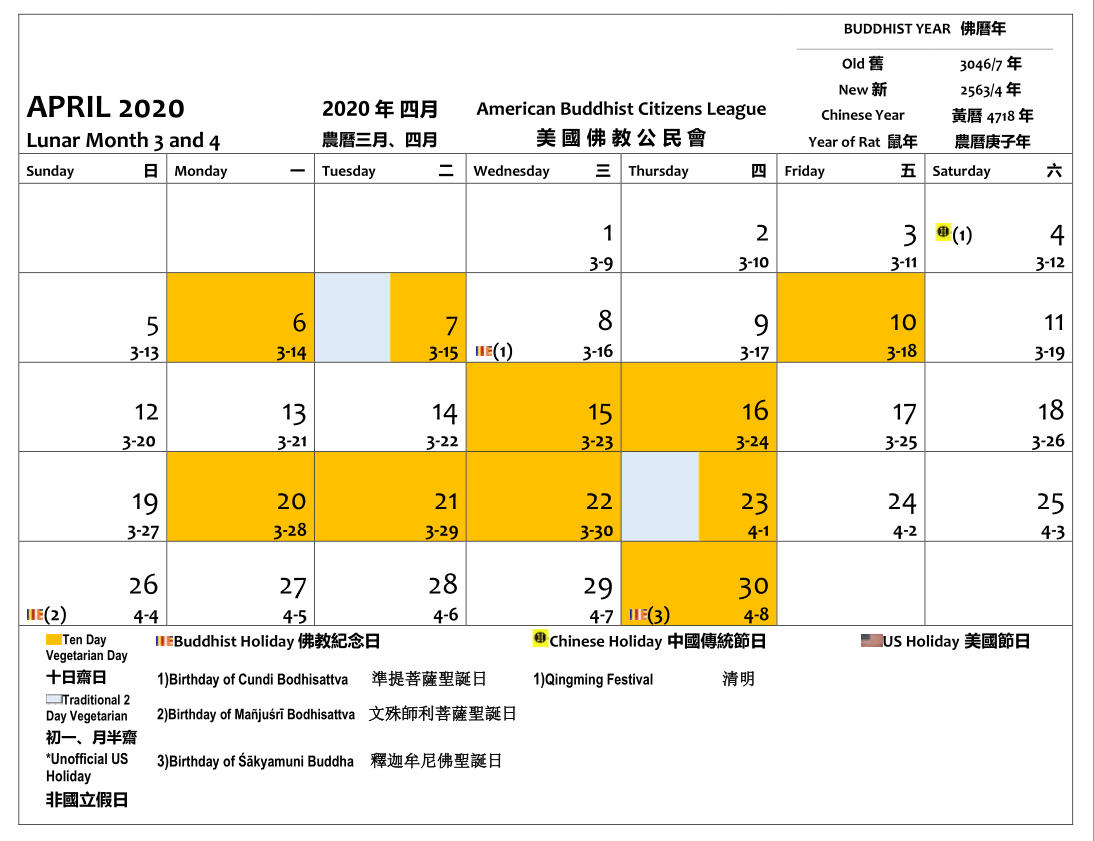
|
American Buddhist Citizens League
2020 年 5月
美國佛教公民會
Śākyamuni Buddha entered parinirvāṇa at Kusinagar India at the age of eighty. The picture shows a 5th century six feet long red sandstone statue of a reclining Buddha accompanied by arhats Dravya Mallaputra (head) (not shown in picture), Subhadra (middle) and Ananda (feet) facing him located inside the Mahaparinirvāṇa Temple. 19th century English archaeologists excavated the remains of items related to Buddha’s parinirvāṇa at the Kushinagar site and successfully restored the broken pieces of this 5th century reclining Buddha statue. Modern Buddhist disciples have since gilded it with gold leaf. Outside the temple on a path parallel to the temple, there are two Sala trees planted by modern Buddhist pilgrims. They remind us that Buddha had entered parinirvāṇa between two Sala trees. (not shown in picture) Kushinagar is one of the four main Buddhist pilgrimage sites mentioned in the Buddhist Tripitaka.
釋迦牟尼佛80歲在印度拘尸那揭羅村入涅槃了。圖為一尊公元五世紀1.8米長紅色砂岩臥佛像,位於拘尸那揭羅的臥佛殿。佛像的基座裡有三位羅漢面向佛祖亦在回憶本師傳的教導。佛祖頭部下面有一位沓婆摩羅子羅漢(圖上未見)、中部下面有一位須跋陀羅羅漢、腳部下面有一位阿難羅漢。十九世紀的英國考古家在拘尸那揭羅挖掘許多與佛祖涅槃有關的遺物,並成功修復了這座公元五世紀臥佛像的殘片。現代的佛教弟子已經把金箔貼上了臥佛像。在寺院外一條與寺院平行的小路上,有兩棵現代佛教朝聖者種植的裟欏樹。它們提醒我們,佛陀在裟欏雙樹間入了涅槃。(圖上未見)拘尸那揭羅是佛教大藏經裡提到的四大佛教朝聖聖地之一。
|

|
American Buddhist Citizens League
2020 年 6月
美國佛教公民會
Śākyamuni Buddha entered parinirvāṇa at Kusinagar India at the age of eighty. The picture shows the 50 feet tall Ramabhar Stupa with a Buddhist monk meditating facing the stupa. The stupa marks the site where the head of the Malla Republic cremated Buddha’s body on the seventh day after his parinirvāṇa.
佛祖80歲在印度拘尸那揭羅村進入涅槃了。圖為總高15米拉馬巴爾佛塔,有一位僧侶面朝佛塔打坐亦回憶本師傳的教導。這座佛塔是末羅共和國領導人在佛陀入了涅槃第七日把佛陀火葬的地點。 |
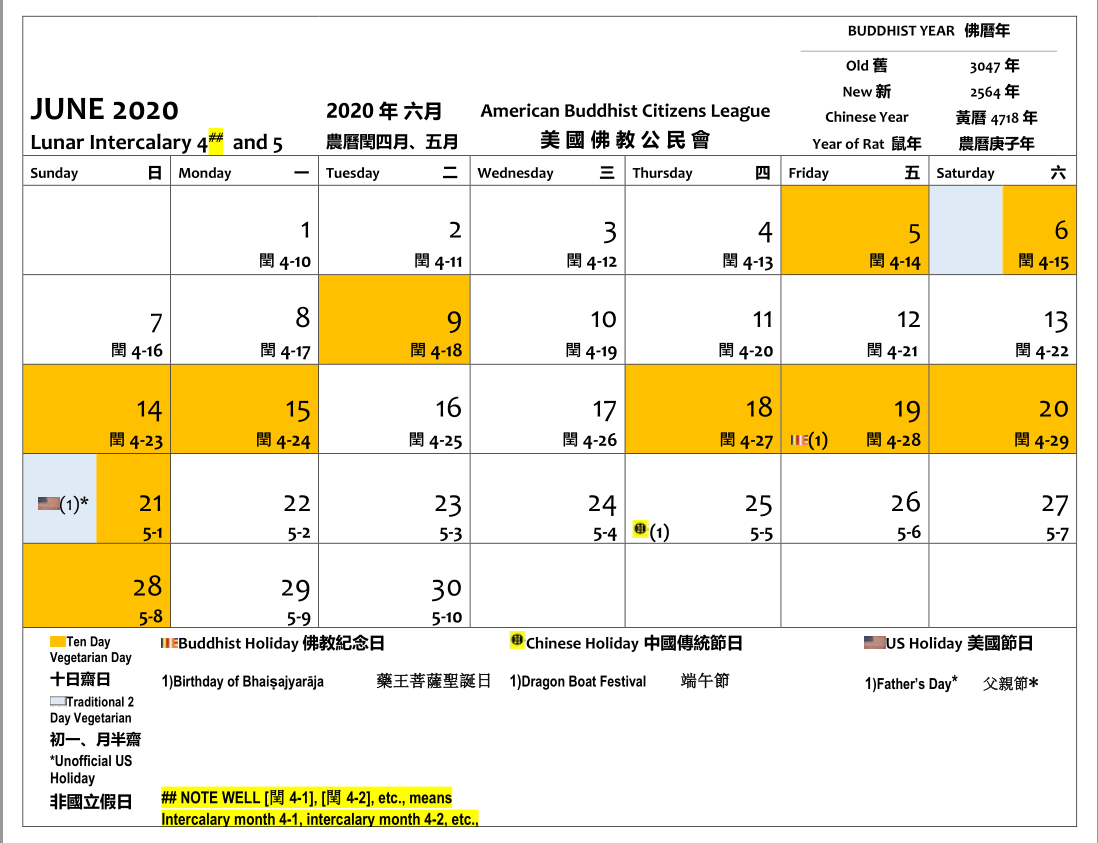
|
American Buddhist Citizens League
2020 年 7月
美國佛教公民會
Gṛdhrakūṭa or Vulture’s Peak located in the town of Rajgir India was the site where Śākyamuni Buddha taught the Lotus Sutra, the Surangama Sutra, the Heart Sutra and the Diamond Sutra as well as other sutras. Jñānagama (Hui’li), the monk from Western India who founded Hangzhou’s Lingyin Monastery once remarked one of the mountains facing the monastery so resembled Gṛdhrakūṭa that it seem as if transported through the air from India to Hangzhou China. Henceforth, that mountain’s name changed to Feilai Peak (the peak that flew over). 印度王舍城(現在是一個小鎮)的靈鷲山(英文- Gṛdhrakūṭa or Vulture’s Peak),是佛祖主要傳法地點之一,比如說《妙法蓮華經》、《楞嚴經》、《金剛經》、《心經》以及其他經。圖為靈鷲山山頂。創建杭州靈隱寺的印度西部僧人慧理大師曾說,靈隱寺山坡對面有一座山,它看起來很像印度靈鷲山,似乎從印度空運到中國杭州。從此,那座山改名為飛來峰 (又名靈鷲峰)。
|
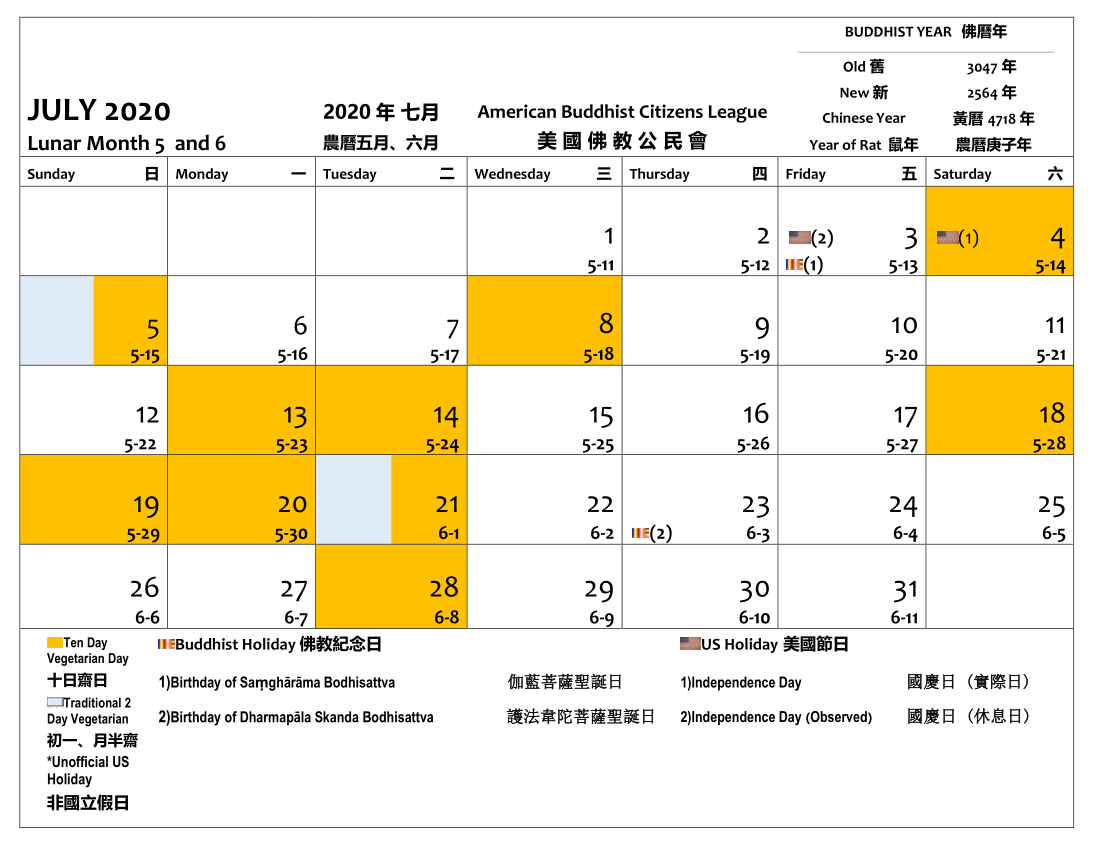
|
American Buddhist Citizens League
2020 年 8月
美國佛教公民會
Mount Putuo is one the 4 holy Buddhist Mountains in China and is where Guanyin Bodhisattva uses Great Compassion to teach sentient beings. Picture shows 108 feet high Statue of Guanyin Bodhisattva of the South Seas dedicated in 1997. The name Putuo comes from the Sanskrit Potalaka, the home of Guanyin as described in the Avataṃsaka Sutra. The origin of Mt Putuo as a Buddhist pilgrimage site may extend to as early as the 4th century CE; however, the first detailed recorded history of Mt Putuo starts only with the arrival of the Tang Period Japanese monk Egaku. Egaku obtained an awe-inspiring statue of Guanyin from Mt Wutai. On his voyage back to Japan with the statue, gigantic waves and ferocious stormy weather impeded the ship from moving. Egaku then had a dream foretelling of his safe passage should he abandoned the statue. He then built a straw hut to house the Guanyin Statue near Mt Putuo’s Cave of Tidal Sounds. A fisherman from the island witnessed these events and later housed the statue in his house for worship. Since the statue seemed unwilling to leave China and chose Mount Putuo as her bodhimaṇḍa, the shrine obtained the name “Unwilling to Leave Guanyin Shrine.” 普陀山是中國四大佛教名山之一,是觀音菩薩用大慈大悲教化眾生的道場。圖為1997年開放的總高33米南海觀音菩薩像。“普陀”這個名字來源於梵文的“補怛洛伽”,即《華嚴經》中所描述的觀音菩薩之道場。普陀山作為佛教朝聖地的起源可以追溯到公元四世紀,然而,普陀山第一部詳細記載的歷史只能從唐朝日本僧侶慧鍔的到來開始。慧鍔從五台山獲得了一尊令人敬畏的觀音像。在他帶著雕像返回日本的途中,巨浪和兇猛的暴風雨阻礙了船的移動。慧鍔當日晚上做了一個夢,預言如果他放棄雕像,他會安全的回到日本。隨後,他在普陀山潮音洞附近修建了一座草棚,用來安置這尊觀音雕像。島上的一位漁夫目睹了這些事件,後來把觀音像安置在他的房子裏供奉。由於雕像似乎不願意離開中國,而選定普陀山為他的道場,所以供奉場所後來獲得了“不肯去觀音院”的稱號。 |

|
American Buddhist Citizens League
2020 年 9月
美國佛教公民會
Mount Putuo is where Guanyin Bodhisattva uses Great Compassion to teach sentient beings. Picture shows Puji Monastery, the largest and most beautiful temple on Mount Putuo. (The other main temples are Fayu and Huiji Monastery.) In front of Puji Monastery is the beautiful Lianhua Pond, (also known as Haiyin Pond) first built during the Ming Dynasty. There are three ancient stone bridges that transverse the pond. The oldest surviving structure on Mt Putuo, Duobao Pagoda dating to 1334 is near the south side of Puji Monastery. The most notable hall within Puji Monastery is the Universal Treasure Hall (Yuantong Baodian), which enshrines a statue of the 29 feet high five-petal Vairocana crown Guanyin accompanied by Sudhana and Nagakanya . There are also 32 other forms of Guanyin on both sides. Numerous other halls honoring other bodhisattvas are also located at Puji. The current temple is a recent renovation of the monastery rebuilt by Emperor Yongzheng in 1734. The name “Puji” dates back to 1689 when the Emperor Kangxi bestowed that name in a royal edict. The original name was Baotuo Monastery and it was built in 1080. Mt Putuo’s international renown is hinted at by the many international gifts donated to it in the past; some of it now kept at the Mt Putuo Museum. 普陀山是觀音菩薩用大慈大悲起教化眾生的道場。圖為普陀山寺院中最大、最佳的普濟寺。(另外主要寺院還有法雨、慧濟寺) 普濟寺前面有建於明朝的一個美麗的海印池。(又稱蓮花池) 有三座古老的石橋橫跨池塘。普陀山上現存最古老的建築,建於1334年的多寶塔靠近普濟寺的南邊。普濟寺內最佳的殿堂是圓通寶殿,它供奉著一尊8.8米高的毗盧觀音坐像(頭戴著五瓣毗盧冠,每瓣一化佛,正中有“毗盧遮那佛”),並有善財和龍女陪伴。四周還有32種應化觀音像。在普濟寺還有許多供奉諸位菩薩的殿所。現在的寺院是最近由雍正皇帝在1734年重建的寺院的翻修。“普濟”這個名字可以追溯到1689年康熙皇帝一個聖旨而授予這個名字。原名為寶陀寺而始建於1080年。普陀山的國際聲譽是由過去捐贈給普濟寺的許多國際貽贈文物所暗示的,其中一些現在保存在普陀山博物館。 |

American Buddhist Citizens League
2020 年 10月
美國佛教公民會
Mount Wutai is one of the 4 holy Buddhist Mountains in China and is where Mañjuśrī Bodhisattva uses Great Wisdom to teach sentient beings. Picture shows the 184 feet high Buddha Relic Stupa of Tayuan Temple built by the Nepali artisan Araniko in 1302 (popularly known as the Great White Stupa). After the stupa’s repair in 1407, it became part of the newly created Tayuan Temple. However, the Great White Stupa was originally part of the Xiantong Monastery built between 58-73 CE. The Great White Stupa is notable for enclosing a Tang dynasty stupa, which in turn enclosed an Asokan Buddha Śarīra stupa. The stupa’s decorated base on the south side has three shallow stone pits, the one on the right side contains a Ming era tablet engraved with the footprints of Buddha; these footprints were engraved based on an ink rubbing of Buddha’s actual footprints (according to medieval Indian tradition) brought back from India by the famous Tang dynasty translator Xuanzang. It is a site of veneration by Tibetan, Mongolian and Han Chinese Buddhists. The stupa is now the symbol of Mt Wutai. There is a smaller white stupa to the east called the Lesser White Stupa (not seen in picture), which contains the golden hair śarīra of Mañjuśrī Bodhisattva. Mount Wutai became a Buddhist pilgrimage site due to its description as the residence of Mañjuśrī in the Avataṃsaka Sutra where Buddha said, “After my parinirvāṇa, to the northeast of Jambudvīpa (Indian Subcontinent), there is a country called Great Zhenna (China). In this country there is a mountain called Five Peaks (literal meaning of Wutai is Five Terrace) where the youth Mañjuśrī lives and travels in order to teach Dharma to sentient beings”. Mt Wutai is notable as an international pilgrimage site from at least the Tang dynasty. Many Indian Buddhists (monks and laypersons alike) made pilgrimage to Mt Wutai during the heydays of Indian Mahayana Buddhism.
五台山是中國四大佛教名山之一,是文殊菩薩用大智慧教化眾生的道場。圖為1302年尼泊爾藝術家阿尼哥建造的塔院寺總高56米的釋迦牟尼佛真身舍利塔(俗稱大白塔)。1407年佛塔修繕後,成為新建的塔院寺的一部分。然而,大白塔最初是在公元58-73年間修建的顯通寺的一部分。大白塔以包圍唐代佛塔而聞名,而唐代佛塔又包圍了阿育王佛祖舍利塔。南面的佛塔裝潢基座有三個淺石坑,右邊的一個坑裏有一塊明代石碑,上面刻著佛祖的脚印;這些脚印是根據著名的唐代翻譯者玄奘從印度帶回的佛祖的實際脚印(根據中世紀印度傳統的口傳)的拓印而雕刻的。它是藏傳、蒙古和漢族佛教徒的聖地。大白塔現在是五台山的象徵。東邊有一座較小的白色佛塔,叫做小白塔(圖中未見),裡面有文殊菩薩的金髮舍利子。五台山朝聖聖地的起源可能追溯到《華嚴經》中的文殊菩薩住所描述:“我(佛陀)滅度後,與南瞻部洲(印度次大陸)東北有國名震那(中國),其國中有山號曰‘五頂’,文殊師利童子遊行居住,為諸眾生於中說法”。五台山是一個著名的國際朝聖地點,至少從唐代開始。在印度大乘佛教鼎盛時期,許多印度佛教徒(僧侶、居士、等等都是如此)到五台山朝聖。 |

American Buddhist Citizens League
2020 年 11月
美國佛教公民會
Mount Jiuhua is one the 4 holy Buddhist Mountains in China and is where Kṣitigarbha Bodhisattva uses Great Vows to teach sentient beings. Picture shows the Kṣitigarbha Chan Temple, which was first built during the Southern Song Dynasty (over 800 years ago). A prince of Silla (one of the three kingdoms in Korea during the Tang dynasty) name Kim Gyo-gak became a monk at the age of 24 and came to Mt Jiuhua practicing Buddhism by meditating and enduring austerities for 75 years at Mt Jiuhua. He entered parinirvāṇa at the age of 99. Buddhists regard him as an incarnation of Kṣitigarbha Bodhisattva and his whole body relic is preserved at the Shen Guang Ling (Holy Light Ridge).
九華山是中國四大佛教名山之一而且是地藏菩薩用“大願”起教化眾生的道場。圖為南宋(八百多年前)始建的地藏禪寺。叫做金喬覺的新羅國王子(新羅是唐代朝鮮半島中三國之一)24歲出家,來到九華山修行,在九華山打坐苦修75年。他99歲年齡進入涅槃了。佛教徒認為他就是地藏菩薩的化身。他的全身舍利子保存在神光嶺。
|
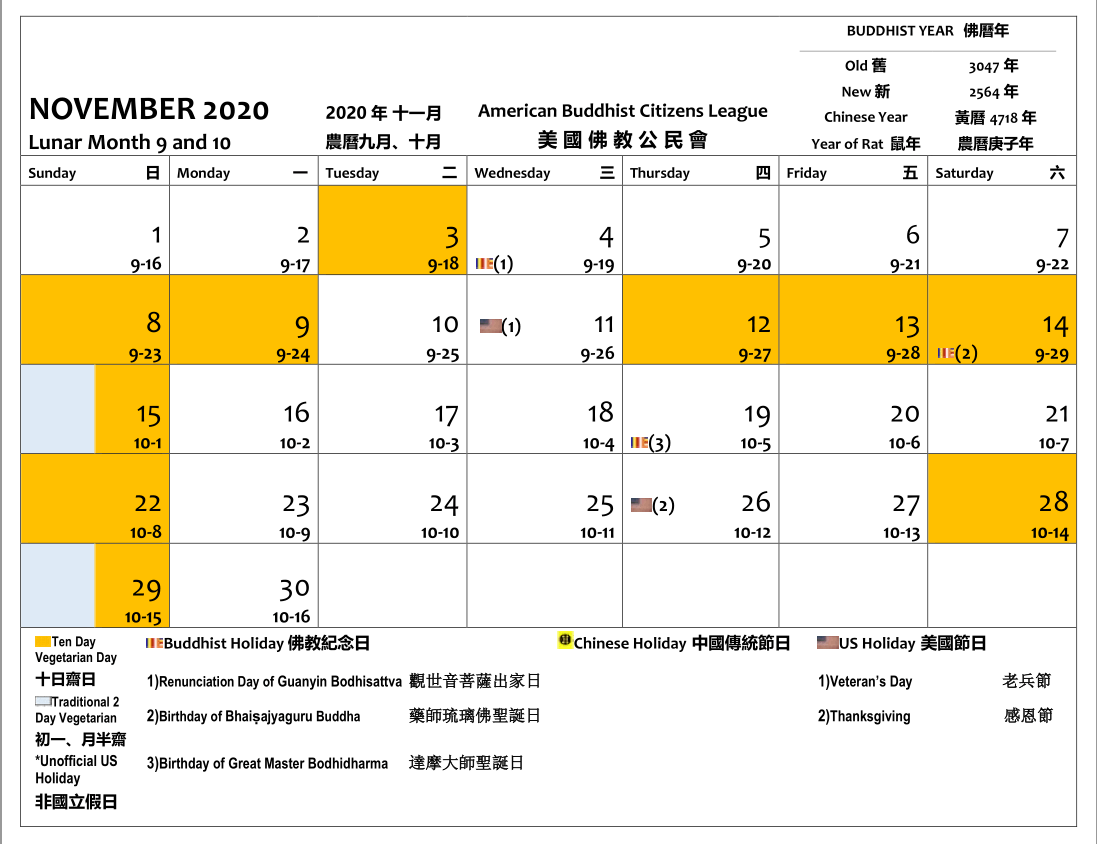
American Buddhist Citizens League
2020 年 12月
美國佛教公民會
Mount Emei is one the 4 holy Buddhist Mountains in China and is where Samantabhadra Bodhisattva uses Boundless Virtue (Six Paramitas of Giving, Keeping Precepts, Patience, Vigor, Meditative Concentration and Prajna Wisdom) to teach sentient beings. Picture shows the 158 feet high Statue of Samantabhadra Bodhisattva of the Ten Directions dedicated in 2006 and located on the 10,095 feet high Golden Summit. The statue is resplendent with symbolic meaning. The ten heads represent the Ten Vows of Samantabhadra. The six tusks of the elephants represent the six paramitas and so forth. Mt Emei’s first temple may have been the Eastern Han Dynasty’s Puguang (Universal Light) Hall built on the Golden Summit by an elderly herb collector named Pugong. Pugong followed a trail of giant lotus-like footprints. This led him to the shocking discovery of what seemed to be a ṛṣi riding a six-tusk elephant on top of a lotus seat. After descending Mt Emei, the old man described his experiences to an Indian Buddhist monk who suggested that the ṛṣi was actually the bodhisattva Samantabhadra. Pugong took refuge in Buddhism and then built the Puguang Hall on the Golden Summit. Subsequently, the Tang Dynasty saw the building of a silver colored roof temple called the Woyun (Lying amidst Clouds) Temple and the Ming Dynasty saw the building of a gold-colored roof temple called the Jindian Hall (Golden Hall). In recent times, fires burned down the summit’s temples several times. The current temples on the Golden Summit were all rebuilt in 2006. 峨眉山是中國佛教四大名山之一而且是普賢菩薩用廣大無限德行(六度:布施、持戒、忍辱、精進、禪定、般若智慧)起教化眾生的道場。圖為2006年開放的十方普賢菩薩像,總高48米,位於3077米的金頂。這尊雕像金碧輝煌,具有豐富象征意義。這十個頭代表普賢菩薩的十個大願。大白象的六根長牙代表廣大無限德行的六度(又叫六個波羅蜜多),等等。峨眉山的第一座寺院可能是東漢的普光殿,它是由一位叫蒲公的採草藥老翁在金頂上建造的。有一天蒲公在峨眉山採藥時候,他見到一位仙人坐在一頭六根牙象背上的蓮台座位,驚嚇蒲公一跳,蒲公就離山回家去了。後來,蒲公向一位印度僧侶講述自己的經歷,僧侶以為騎象的“仙人”實際上是普賢菩薩。蒲公皈依佛教,在金頂修建了普光殿。隨後,有唐代銀色瓦片的臥雲禪寺,還有明朝的金色頂部的金殿。近代,金頂上寺院邁到幾次火災而被燒毀了。現在的金頂上所有的寺院是2006年建成的。 |

May the merits of these webpages bring Health and True Happiness to our members and their families, World Peace and Peace and Prosperity in every country in the world.
Contact: Webmaster
Copyright © 2019 American Buddhist Citizens' League and Nityaukṛṣṭa
All Rights Reserved